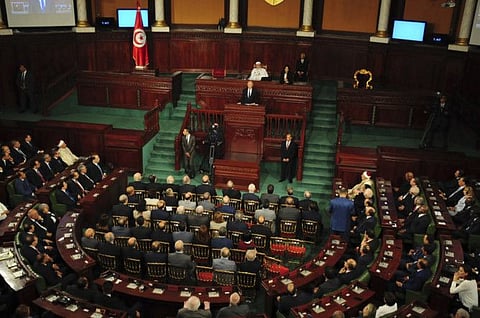How Tunisia’s democracy is taking root
Country trying to overcome structural problems, slumping economy and rising food prices

The expert view is that we’re living in an age of democratic retreat. Nationalist populists and would-be autocrats in democracies are systematically undermining or corrupting their countries’ liberal institutions.
Then there’s Tunisia. At this point, you probably know the cliche. The small North African nation remains the one “success” story of the 2011 Arab Spring, the sole nation to tpreserve democratic transition.
It just held three elections in the space of a month; the last episode of that process took place a few weeks ago, when Kais Saied — a retired-law-professor-turned-independent-anti-establishment-politician — won a presidential runoff election in a landslide.
Saied’s victory delivered a clear message of voter dissatisfaction. Saied alone can’t start addressing the anxieties that catapulted him into power. He formally became the country’s head of state, but Tunisia is still waiting for the formation of its next government. That may take some time.
Saied alone can’t start addressing the anxieties that catapulted him into power. He formally became the country’s head of state, but Tunisia is still waiting for the formation of its next government. That may take some timeIshaan Tharoor
Not unlike elections on the other side of the Mediterranean, Tunisia’s parliamentary results were fragmented, delivering no clear mandate to any single party. The faction to come out with the most seats — 52 out of 217 — was Ennahda, a moderate Islamist party. It is still preparing for formal negotiations that are likely to prove very tricky.
Tunisians kept returning to the ballot box — or taking to the streets to express their dissent, noted columnist Christian Caryl. And so they’ve managed to keep their remarkable democratic experiment grinding along. They passed laws protecting minority rights; civil society groups have continued to press vocally for reforms. (And the fact that Tunisian democracy continues to exist at all remains the most eloquent possible rebuke to the militants).
The country has succeeded in consolidating democracy and making it irreversible.
Unique factors
Analysts point to certain unique factors that make Tunisia different from other nations swept up in the 2011 Arab Spring, including its relatively small size. But Tunisia was “never deemed to be exceptional before 2011,” observed H A Hellyer, a senior associate fellow at the Royal United Services Institute think tank in London.
“On the contrary, the bigotries of low expectations were applied to Tunisians just as much as they were to any other community in the wider Arab world,” Hellyer wrote in a widely read recent op-ed. “If any exceptional qualities are to be ascribed to Tunisia, there are perhaps just two; firstly, the country has autonomy over its own political process, rather than extensive foreign interference. Secondly, because political power is so diffuse in the country, no one could hope to play a zero-sum game and win. So in that regard, Tunisians are again winners, proving the generalisers and essentialists about Arabs and Muslims wrong.”
Economic dividend of revolution
Rather than celebrating this achievement, Tunisia’s politicians are feeling the heat. The country faces a glut of structural problems, a slumping economy, rising food prices, a lack of jobs and a populace clamouring for greater social services. Saied swept to power on a wave of anger over corruption and social inequity. The sense of woe is so rife, Tunisia-watchers note, that some Tunisians have found themselves feeling nostalgic for the relative stability of the days of dictatorship.
“They are still waiting for the economic dividend of the revolution and are unhappy with the performance of the government in terms of actually improving their everyday life,” notes Tunisian politician Zied Ladhari of his countrymen, pointing to the real unfinished work of Tunisia’s transition to democracy. “The main challenge is to actually prove that democracy leads to prosperity. Freedom is important, but also having more economic opportunities and jobs is also important.”
—Washington Post
Ishaan Tharoor writes about foreign affairs for The Washington Post.


